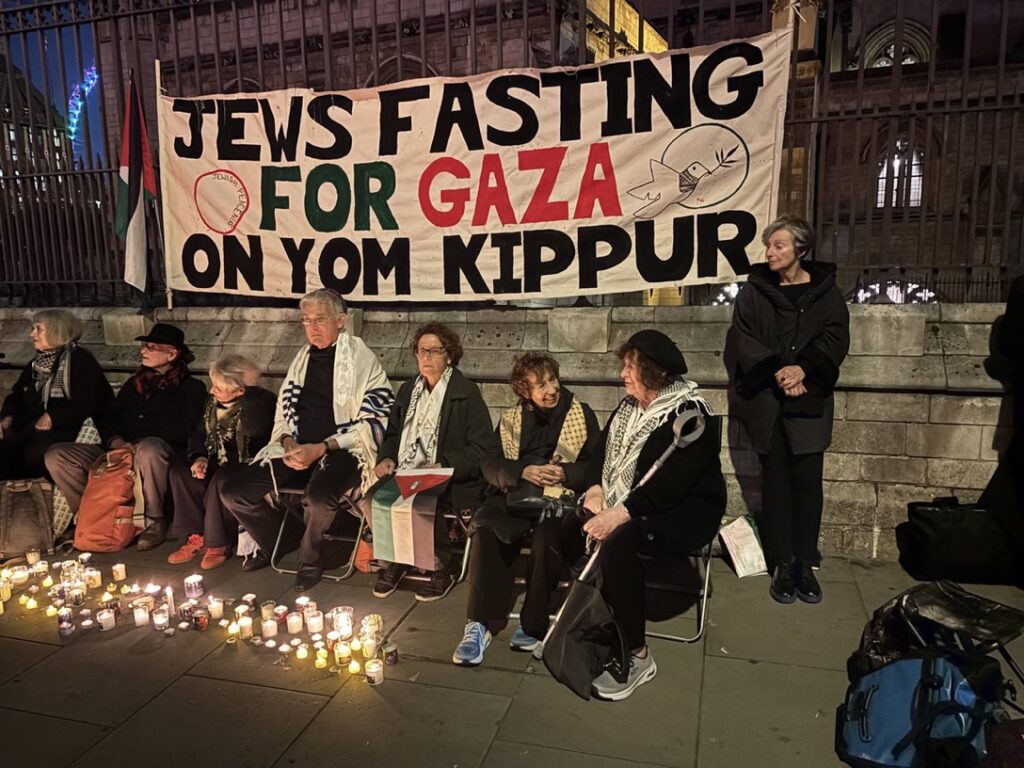Yom Kippur Sermon: Peace Amid Ashes

Photo courtesy of Tom London.
To Follow him on Twitter (X):
@TomLondon6 —
Shalom aleichem. Peace be upon you.
This morning, on Yom Kippur, the holiest day of our year, while Jews fasted and prayed in synagogues across Britain and the world, worshippers in Manchester were attacked outside their shul. A car was driven into the faithful, knives were raised, lives were lost. Blood was shed on a day devoted to confession, mercy, and peace.
The Book of Psalms teaches: “Seek peace and pursue it” (Ps. 34:15). Not only seek — pursue. Chase. Refuse to rest until it is made real. When hatred invades a house of prayer, when Yom Kippur is stained with murder, we hear the Psalmist’s words as command, not poetry.
Yom Kippur’s Demands
Yom Kippur calls us to two reconciliations: bein adam laMakom — between human and God — and bein adam lechavero — between human and fellow human (Mishnah Yoma 8:9). The prophet Isaiah, in today’s haftarah, rebukes those who fast while ignoring the hungry: “Is this the fast I choose? … Is it not to share your bread with the hungry, to bring the poor into your house?” (Isa. 58:6–7).
So when Jews are attacked in Manchester, our teshuvah cannot be abstract. It must be concrete: to bind wounds, to strengthen community, to resist hatred with unity. And when we see suffering in Gaza — children hungry, families displaced — teshuvah demands compassion there, too. Yom Kippur without compassion is hypocrisy.
Image of God in All
The Torah commands: “You shall love your neighbour as yourself; I am the Lord” (Lev. 19:18). Why end with “I am the Lord”? Because each human being is made b’tzelem Elokim — in the image of God (Gen. 1:27). To strike another is to strike the divine image; to scorn another is to diminish the throne of Heaven.
Therefore: the Jew attacked in Manchester and the Palestinian in Gaza both bear that divine image. Our tears for one do not cancel our tears for the other. Compassion is not a zero-sum account; it is the overflow of God’s own mercy.
Voices of Our Sages
The Mishnah teaches: “The Holy One found no vessel to hold blessing except peace” (Uktzin 3:12). Without peace, Torah itself cannot flourish.
The Lubavitcher Rebbe often taught that loving a fellow Jew is itself love of God. He also urged that this love expand outward into ahavat ha-briyot — love of all creatures.
Reb Kalonymus Kalman Shapira, the Piaseczner Rebbe, preaching amid the destruction of the Warsaw Ghetto, urged his followers not to let hatred consume their hearts. Even in the darkest chapter, he spoke of compassion and mercy. If he could call for love amidst ruin, then surely we, in Manchester or in Gaza, must guard our hearts from hate.
Kohelet concludes: “The end of the matter, when all is heard: fear God and keep His commandments, for this is the whole of man” (Eccl. 12:13). Power and conquest pass; reverence, justice, and peace endure.
What We Must Do
The Manchester attack reminds us that hatred stalks our people. We must strengthen Jewish life, guard our communities, and demand justice. But we must not let fear shrink our moral vision. Our covenant is bigger than survival alone.
All suffering remind us that despair and anger fester where peace is absent. We cannot close our eyes and imagine that only our pain counts. The Torah commands: “Do not oppress the stranger, for you know the soul of the stranger, for you were strangers in the land of Egypt” (Ex. 23:9).
So Yom Kippur demands of us:
- To weep for Manchester’s dead and comfort its mourners.
- To stand firm against antisemitism, terror, and hatred.
- To open our hearts to suffering beyond our borders.
- To refuse vengeance, and instead pursue justice with mercy.
Jonah’s Reminder
On this day we also read the Book of Jonah. Even Nineveh, Israel’s enemy, was granted mercy when it repented. If God could turn from anger to compassion for a foreign city, can we not enlarge our own mercy in this generation?
Closing Benediction
The Psalmist prays: “Seek peace and pursue it” (Ps. 34:15). Isaiah dreams: “Nation shall not lift sword against nation” (Isa. 2:4). The Kaddish concludes: “Oseh shalom bimromav.”
May the One who makes peace in His heights make peace upon us, upon Israel, upon the Palestinians our neighbours, upon Britain, and upon all humanity.
Oseh shalom bimromav, Hu ya’aseh shalom aleinu v’al kol yoshvei tevel. Amen.
Tikkun Olam: The Jewish Call to Repair the World
What “repairing the world” means in practice — from the ladder of tzedakah to cross-community projects — and why Jewish ethics treats repair as duty, not mood.
Holocaust Survivor at the Center of Britain’s Crackdown on Pro-Palestinian Protests
Survivor testimony meets Britain’s new protest policing: Stephen Kapos and Carolyn Gelenter’s cases test how far the state can push security over speech.
Yiddish New York: A Living Heritage of Torah, Safety, and Continuity
New York’s living Yiddish ecology — archives, stages, schools — and today’s debates on community security and education standards.


